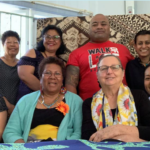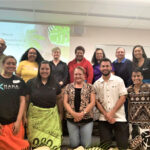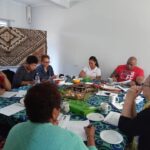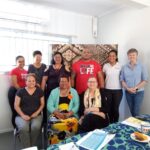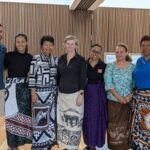In cultural respect
Pacific Islanders acknowledge the traditional owners of the land.
We greet their lands, We greet those who have gone before us.
We greet the Elders, We greet those who have yet to come
Being able to feed yourself and your family with food that is of sufficient quantity and quality for a healthy and active life is a fundamental human right. In countries such as Australia, where the quantity of food produced is enough for three times the population, household food insecurity (HFI) should not be a concern.
However, in some areas and communities, one in four households are potentially going without food and Māori and Pasifika families are at greater risk due to the impact of the Trans-Tasman Travel Agreement (TTTA). HFI has serious implications for health with increased healthcare use, risk of chronic conditions including mental health issues, as well as developmental and behavioural implications for children. Queensland has the second largest diaspora of Māori and Pasifika (102,000) outside of New Zealand and there is limited data that explores HFI within this community.
Our approach
Co-created by and for Māori and Pasifika communities, this qualitative and collaborative study addresses this lack of understanding and data. The Māori and Pasifika diaspora in Southeast Queensland (SEQ) face numerous challenges including low incomes, under or lack of employment, poor access to education, high exposure to the justice system and disrupted physical and mental health. Conversely, they are highly resilient, connected and have a deep understanding and drive to address the issues their communities encounter. Therefore, the aim of this study was to take a community-centred, culturally-informed and holistic approach to investigate what food means for us, what are the expectations and challenges faced by our communities when putting food on the table, and what solutions have been initiated and how can they be co-designed to improve HFI for Māori and Pasifika families and communities.
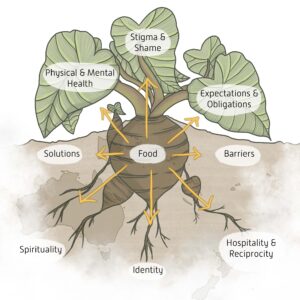
This taro plant illustrates eight key themes that emerged from the interviews which are shown to be all interconnected by food: identity, hospitality and reciprocity, and spirituality form the roots or foundation of the meaning of food for Māori and Pasifika peoples; solutions and barriers form the soil or structure from which these understanding sand practices of food are nourished or restricted; physical and mental health, expectations and obligations, and stigma and shame form the leaves of the taro plant, representing the surface-level experiences and challenges of food insecurity. The diagram overlies a map of Australia, Aotearoa and some Pacific Islands to symbolise how our peoples’ experiences of food insecurity may differ between diasporic and homeland communities but are simultaneously intertwined by socio-cultural and genealogical ties that transcend space and time.
Real-world Impact
The significance of this research was eloquently summarised by a Maori elder, a member of the Steering Committee and a Community Researcher, Aunty Wynn Te Kani, who said:
“What emerged from the research was that Māori and Pasifika peoples in SE Queensland, for a multitude of reasons, are confronted by food insecurity. Food security depends on communities having resilience that comes through support of individuals, through maximising information and positive choices, and communities, through co-operative action based on community cultural values, like food sharing. What one may not have, another may have an abundance of.”
Food security also depends on co-creation, like growing food in community gardens, where everyone can share, and if there is excess, it may be used as seed stock or sold to fund crop replanting. Working toward food security has the power to heal, through righting previous harms and injustices, and dealing with issues such as inequality and lack of equity.
Where to from here
Inequality and lack of equity are social justice issues that have direct impact on community breakdown and involvement in the justice system, and it is imperative to the present and future stability of Māori and Pasifika communities that these issues are addressed.
A significant step towards achieving this would be to better address challenges of food insecurity that our people face and by continuing to build upon this research project hand-in-hand with the wider Māori and Pasifika communities in SE Queensland.
The research outcomes of this project form the first part of this community-led project. The next steps will involve:
- Community talanoa forums to develop action plans for advocacy and solutions.
- Working out how we can “measure” food insecurity so we can convince government bodies of the seriousness of the issue.
- Developing social enterprises that will support communities economically to build access to food that promotes holistic health.
Gallery
Publications
Lead Researchers
Steering Committee
- Ms. Alvina Salemanesa Samoan Community Member
- Aunty Violet Langon Fijian Community Elder, Co-founder Kingdom Community Life Care Ltd
- Aunty Wynn Te Kani Maori Community Elder, Radio Broadcaster
- Mr. Eddie Tavae Kiwi Daddy’s Managing Director – QLD, Samoan Community Leader
- Ms. Daphne Santos Community Youth Leader Australian Tongan
- Ms. Iree Chow Pasifika Women’s Alliance Inc (PWA), Community Youth Leader, Federated States of Micronesia and Solomon Islands
- Ms. Maureen Mopio-Jane Freelance Pacific Community Journalist (Producer Radio 4EB), PNG Elder
- Ms. Nicole Alexander Rotuman Community Member & PWA member
- Ms. Sarai Tafa Project Manager, Pasifika Young Peoples Wellbeing Network (PYPWN), Samoan Youth Leader
- Radini Malo Vaimoso Semaia Multicultural Health Worker, Ethnic Community Council Queensland (ECCQ) and Samoan Community Elder
- Mr. Roman Kingi Niuean Community Elder
